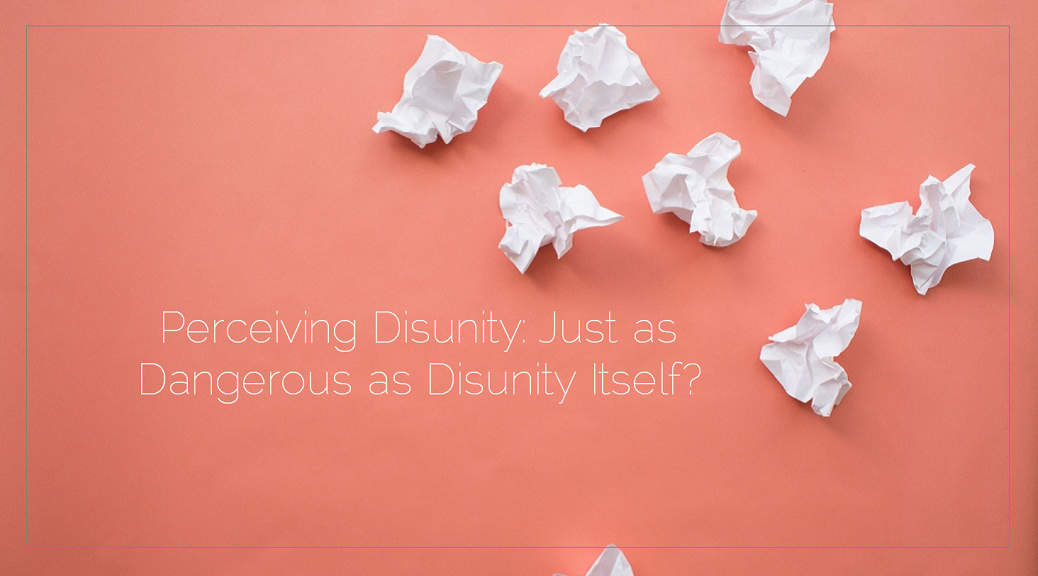A friend of mine who is from a specific part of the world decided recently to organize a get together only for people from that area, kind of like a missing-home get together. I thought it was a great idea, until another friend of mine, from another part of the world, pointed out that it was creating false boundaries and potential disunity. She found this particularly ironic that, at the same time, there was going to be a study about overcoming prejudices.
This wasn’t the first or the last time this happened. A couple of months ago, another friend of mine organized a prayer evening only for women. One man from the community mentioned that this goes against an attitude of openness to all, as basically half the population—the men—were excluded.
I have been turning this over in my mind for quite some time now, and thanks to a particularly insightful conversation, have come to realise that our perception of disunity is just as important as actual disunity.
Let’s focus on the case of the man who was upset that a prayer evening only for men was organised.
Could there be another reason for this prayer evening to be only for women? I asked the hostess and she said that she wanted to create an intimate space for women to reflect on things that were unique to the female experience. For example, as spiritual beings, we should be able to not let our moods dictate our actions—how can women figure out how to not let the insane hormonal fluctuations not affect them?
She also mentioned that the participants are encouraged to talk about what is discussed during these prayer evenings with their significant other to engage them in the discussion, and that should the women feel comfortable enough, eventually the prayer evening would be opened up to men as well.
It doesn’t seem at all like an exclusion of men to me. It actually reminded me of “specializations” in medicine. While there is a branch of medicine that remains focused on the entirety of the human body’s experience, there are specialized branches that focus as needed on certain categories. If you think of the entire human race as a body, then this prayer evening for women could be, quite simply, a “specialization” of sorts during which the “experts” will take a deeper look at something specific and then take it back to the general conversation on the health of the entire body.
It seems clear to me, then, that in this case, there was no intention to create disunity. Then where does the perception of it come from?
As for the discussion evening that brought together only people from one geographic region for a study evening on how to overcome prejudices, it’s a little bit of the same thing. The people from this geographic region are oftentimes referred to in quite derogatory terms. When I asked a couple of the people who attended that discussion evening what had happened, they mentioned that it was mainly a way to not get dragged into that discourse. That is to say, they often discussed how they can avoid the trap of becoming prejudiced against those people who are prejudiced about them.
When I asked why can’t other people attend the meeting, the consensus was that of course everyone is invited, but most people who are not treated this way don’t understand what it’s like, and the evening often devolves into explanations into the historical roots of this treatment and the current state of affairs. While this conversation is extremely important, the conversation of how not to become oneself prejudiced as well is just as important; so the group of individuals from that particular region made sure that both lines of conversation continue as much as possible.
Yet again, this reminds me of the medical analogy I mentioned above. This group of individuals is keeping in mind that they shouldn’t isolate themselves and that the conversation about the prejudices they are suffering from should not be isolated from the general conversation about the unity of humanity. But at the same time, they are taking the time to delve into the specifics of their situation so as to enable them to deal with it.
And yet again, it seems clear to me, then, that in this case, there was no intention to create disunity. Then where does the perception of it come from?
Picture courtesy of Death To Stock.


What an insightful and thought-provoking post!
I think we have to re-visit the definition of unity, which I think includes a lot of things from love and inclusion, but also understanding and strong bonds of friendship.
It’s only natural that some people get along better than others, and I think it all comes down to an approach – if you are having an intimate dinner with your family for example, there is no need to invite the whole neighborhood – you have to start small and build relationship in the appropriate setting and in the right time. At times, you need to focus on one pocket of the community so that they can grow and connect (like the group of women) but then the general approach isn’t to remain secretive about the discussions that happened, but to open the dialogue with the men outside of this circle, to eventually open it up. If anything, I feel as though this is a healthier and more organic approach rather than throwing everyone together with the expectation that men will be comfortable to talk about some of these themes.